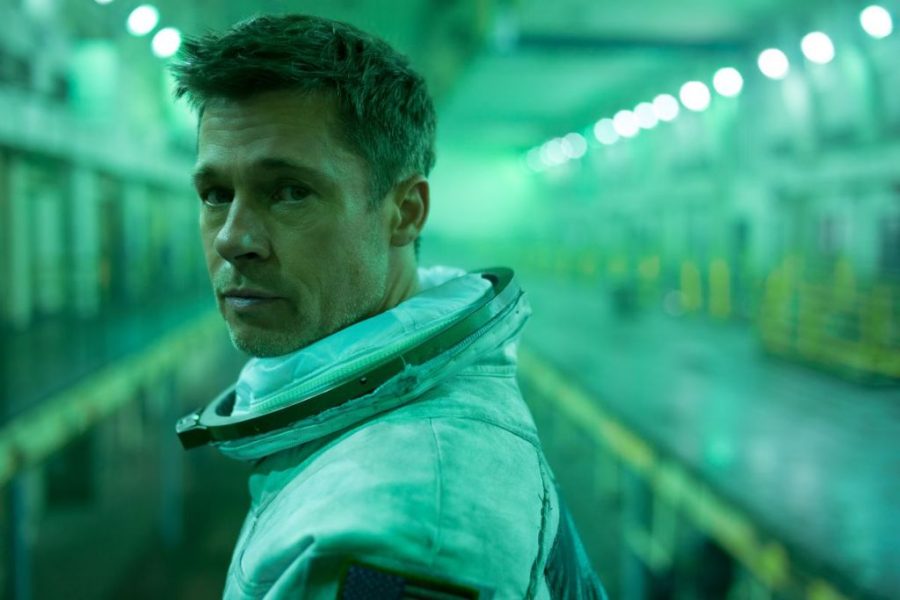“Ad Astra” Dives Into a Black Hole of Daddy Issues
“Ad Astra” begins with a declaration of epic proportions: the search for alien life is what drove humanity to the stars.
The actual film, though, is about daddy issues. Major Roy McBride (Brad Pitt) ventures into the great unknown to find his father, the famed space icon H. Clifford McBride (Tommy Lee Jones), who has finally returned to the solar system years after his expedition for alien life went missing.
Unfortunately, H. Clifford’s ship refuses to go farther than Neptune and starts bombarding Earth with technology-destroying energy surges. The U.S. military recruits Roy to figure out what happened to his father.
While “Ad Astra” opens with an impressive scene, which sees Roy narrowly survive the first surge, the rest of the film lacks any magic whatsoever. Even as these surges annihilate the Earth, the characters are more concerned with H. Clifford.
By the end of “Ad Astra,” it becomes clear that the surges’ only purpose was to artificially inject tension into the story. Like so much else in the movie, it’s just a pretense for the clumsy father-son relationship.
The recent rash of scientifically-inspired (if not particularly accurate) space flicks usually follow a rugged white man whose dedication to science is rivaled only by love for his family. “Ad Astra” somehow crafts a version of this archetype that’s even more boring. Pitt depicts a man who has become cold and withdrawn after his father abandoned him at a young age.
“Ad Astra” goes to great lengths to show that Roy’s career is stifled, his marriage is over and his life is aimless. Much of the film’s stunning visuals are accompanied by Roy’s droning narration, which mostly concerns his deep-rooted personal issues. Even Brad Pitt can’t breathe life into such a dull character as he meanders his way through the cosmos to confront his absent father.
Unfortunately, the story doesn’t do much to liven things up. “Ad Astra” puts an undue emphasis on Roy’s search for his father, to the point that everything else becomes an accessory. Forgettable, purely functional dialogue ensures that the film entirely lacks real emotion or even meaning.
That is especially unfortunate because “Ad Astra” envisions a believable future instead of just quickly concocting one to serve the plot. The stunning visuals construct a complex setting that has been co-opted for a deep space therapy session. The best-realized sequences of the film are almost complete non-sequiturs, existing only to maintain the audience’s interest in admittedly crude ways.
The moon pirate sequence is a perfect example, while also embodying “Ad Astra” as a whole. During a detour on the moon, Roy’s lunar buggy convoy is ambushed by raiders. What follows is a tense action sequence that tries to maintain some semblance of realism that prevents it from becoming too absurd.
But the camerawork, effects and pacing can’t make up for the flawed concept. Outside of a throwaway line, the viewer is supposed to accept moon pirates in a fairly grounded, humorless setting. Like the rest of the film, superb presentation struggles to justify the story.
Even outside of those interruptions, the visuals are impressive, particularly when it comes to the use of lighting and point of view shots. These two elements are employed to emphasize the vastness of space and the immense needs of space travel. The special effects are mostly CGI but still convincing. “Ad Astra” manages to create some real tension and disturbing sequences, even with the limited scope offered by its PG-13 rating.
The dazzling imagery doesn’t hide the different influences that litter “Ad Astra.” The film draws heavily from “2001: A Space Odyssey” and even less from philosophically-taxing movies like “Alien.” This lends “Ad Astra” a strong visual language, but all the borrowing opens the film up to some unfavorable comparisons.
While not a particularly effective film, “Ad Astra” does at least successfully communicate its message about personal responsibility. Most of the film’s peers present science and space exploration as an escape from Earth’s ills.
Meanwhile, “Ad Astra” reminds the viewers that wherever we go, we’ll be taking our problems with us. Unless, of course, we fix them here on Earth.
If nothing else, though, at least “Ad Astra” got that much right.















































































































































































































